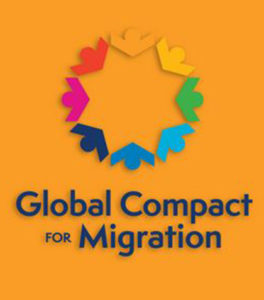Global Compact on Migration two years on
The Global Compact for Migration, adopted by countries in 2018 as a comprehensive framework for cooperation on international migration, is leading to progress, the UN claims.
United Nations Secretary General Antonio Guterres says the compact is ”taking root in promising ways”.
 But critics say the twin global compacts on migration and refugees might actually be hindering resettlement, especially of refugees.
But critics say the twin global compacts on migration and refugees might actually be hindering resettlement, especially of refugees.
Academics Lama Mourad and Kelsey Norman say the compacts’ well-meaning intention to recast refugees and migrants as an economic benefit to nations that receive them could backfire.
The UN disagrees, saying the compact reflects a growing global understanding of the great benefits of human mobility.
“But it also recognizes that, if poorly managed, migration can generate huge challenges, from a tragic loss of life to rights abuses and social tensions”, Mr Guterres said launching a new report on the Compact’s implementation.
While the COVID-19 pandemic heightened challenges and negatively affected more than 2.7 million migrants, particularly women and girls, new practices have emerged to protect those on the move, Mr Guterres said.
He outlined initiatives by countries such as extending residence and work permits, regularising the status of undocumented migrants, and pursuing alternatives to detention.
“And while some States have suspended returns owing to unsafe conditions, others have made efforts to ensure that those returning or who have been deported are supported”, he said.
The UN head said more needed to be done to expand these initiatives.
Mr Guterres pointed to three key recommendations in the report, the first of which is to embrace the spirit of collaboration and the notion that no country can address migration alone.
He also said that the COVID-19 pandemic has highlighted the value of migrant labour, urging countries to recognise their contributions, through ensuring fair and ethical recruitment and access to work and health care as well as social protection without discrimination.
Mr Guterres said social inclusion and cohesion should be strengthened between host communities and migrants and discrimination issues addressed.
“Migrants should not be stigmatised or denied access to medical treatment and other public services. We must strengthen the immunity of our societies against the virus of hate”, he urged,” he said.
Mr Guterres said human diversity should be considered an asset, not a threat, urging nations to appreciate the “richness of our differences while never losing sight of our common humanity and dignity”.
“We can draw on the Global Compact for safe, orderly and regular migration to cover better from COVID-19, with greater inclusion and sustainability. And if we are united, we can make migration work for all,” he said.
But Dr Lama Mourad, of the University of Pennsylvania, and Dr Kelsey Norman, of the Baker Institute for Public Policy, have argued that almost two years after the compact was signed by 164 countries, refugees around the world remain in danger.
“The compact ostensibly seeks to ease the pressure placed on countries hosting refugees and to make refugees more self-reliant. It holds out hope that they can return to their home country if conditions improve. Failing that, the compact also attempts to ease their passage from the countries where they seek immediate asylum and toward third countries that might host them for the long term,” the pair wrote.
“Governments are encouraged to offer labour mobility opportunities for refugees, including through the identification of refugees with skills that are needed in third countries,” they say.
“This is a dangerous way to think about people in need. While governments are bound to have pragmatic concerns about how many refugees they can afford to take in, the rights of those whose well-being is in greatest peril are neglected when only the “best and brightest” refugees are selected for resettlement.
“Rather than further entrenching the right of states to select refugees with high economic or integration potential, the global community should move toward more effective and binding multinational solutions—such as a system of resettlement quotas based on a country’s GDP, and restrictions on the ability to define a resettlement scheme using criteria not specified in the 1951 UN Refugee Convention,” the academics said.












